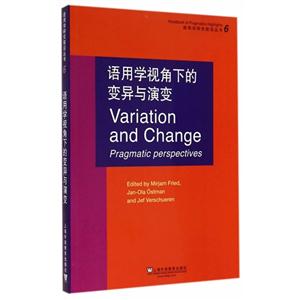-
>
妙相梵容
-
>
基立尔蒙文:蒙文
-
>
我的石头记
-
>
心灵元气社
-
>
女性生存战争
-
>
县中的孩子 中国县域教育生态
-
>
(精)人类的明天(八品)
语用学视角下的变异与演变 版权信息
- ISBN:9787544636780
- 条形码:9787544636780 ; 978-7-5446-3678-0
- 装帧:一般胶版纸
- 册数:暂无
- 重量:暂无
- 所属分类:>
语用学视角下的变异与演变 本书特色
《变异和演变的语用学》(实际成书时书名调整为《语用学视角下的变异与演变》(作者:弗里德),variationandchange:pragmaticperspectives)收录的条目涉及语言的变异和演变。 通常情况下,变异,包括方言、洋泾浜语、克里奥语,属于社会语言学的范畴,而演变则属于历史语言学的研究领域。借词(borrowing)、方言(dialect)、语域(register)、语言接触(languagecontact)、历史语言学(historicallinguistics)、历史语用学(historicalpragmatics)等自然列入该书。另外,在变异和演变的标题下,该书还收录了中介语语用学(interlanguagepragmatics)、类型学(typology)、行话(jargon)等能够导致语音、句法、语义变化的其他因素。
语用学视角下的变异与演变 内容简介
“语用学研究前沿丛书”为外教社从John Benjamins出版公司引进的一套10本语言学原版专著,丛书研讨的专题包括了语用学与哲学、认知语言学、语法、社会学、文化学的交叉领域,展现了语用学研究的*前沿发现。
语用学视角下的变异与演变 目录
acknowledgements
introduction: from instances of change to explanations of change
miriam fried
1. approaches to variation and change
2. diachronic analysis and 'pathways' of change
3. intra-lingual variation
4. cross-language variation
5. summary and outlook
borrowing
jeanine treffers-daller
1. introduction
2. short historical overview
3. definitions of borrowing: terminological issues
4. different types/classifications of borrowing
5. the integration of borrowings
6. constraints
7. quantitative approaches
8. psycholinguistic approaches
contact linguistics
michael meeuwis & jan-ola ostman
1. introduction
2. contact in relation to classificatory bases in linguistics
3. contact and location
4. direction of interference
5. indirect influence in language contact
6. contact as process: towards pragmatics
creoles and creolization
salikoko mufwene
dialect
ronald macaulay
1. introduction
2. other labels
2.1 variety
2.2 lect
2.3 vernacular
2.4 social dialects
3. dialects as local forms of speech
4. some examples of dialect studies
5. some recent developments in the u.s.
dialectology
georges de schutter
1. definition
2. an outline of history
3. aims of the investigation
3.1 the impact of history on the origin and evolution of languages
3.2 linguistic reconstruction
3.3 the study of universals of language, especially implicational scales
3.4 sociopragmatic and attitudinal aspects
3.5 communicative aspects
4. dialect atlases
evolutionary pragmatics
wolfgang wildgen
1. pragmaticism, pragmatics, adaptation and the evolution of language
2. sign-functions and their evolutionary significance
2.1 the triad of sign functions
2.2 the evolutionary interpretation of the triad of functions
2.3 selective value of communication and symbolic behavior
3. can the pragmatics of tool production and tool-use tell us something about the origin of language?
3.1 instrumentality in higher mammals and man
3.2 is tool-making a pragmatic source of propositional semantics?
3.3 cro-magnon life space and the pragmatic space of decorated caves
4. from ecological to cultural pragmatics
5. conclusions
historical linguistics
louis goossens
1. introduction
2. hl in pre-generative work
3. hl and generative grammar
4. new perspectives
5. explicit
historical pragmatics
andreas h. ]ucker
1 introduction
2. origins
3. data problems
4. topics
4.1 discourse markers
4.2 speech acts
4.3 politeness
5. new perspectives
implicature and language change
kate kearns
1. introduction
2. analyses citing conversational principles
3. implicature and metaphor
4. implicature, metonymy and merger
5. inferences based on lexical concepts
6. summary
interlanguage pragmatics
gabriele kasper
1. definition and scope
2. pragmatic comprehension
2.1 comprehension of nonliteral utterances
2.2 assessment of politeness
2.3 sociopragmatic assessment
3. production of linguistic action
4. development of pragmatic competence
4.1 cross-sectional studies
4.2 longitudinal studies
4.3 theoretical accounts
5. pragmatic transfer
5.1 definition
5.2 positive transfer
5.3 negative transfer
5.4 transferability
6. communicative effect
7. pragmatic norms
8. language teaching
9. research methods
lo. further reading
jargon
luisa martin rojo
1. introduction
2. studies of delinquent jargon and the introduction of a 'value-giving measure'
3. interpretations of antilanguages and their functions
3.1 halliday: the concept of antilanguage
3.2 sociolinguistic functions of delinquent jargon
4. varieties of jargon
5. conclusions
language change
raymond hickey
1. introduction
2. issues in language change
2.1 internal and external factors
2.2 simplicity and symmetry
2.3 iconicity and indexicality
2.4 markedness and naturalness
2.5 telic changes and epiphenomena
2.6 mergers and distinctions
2.7 possible changes
2.8 unidirectionality of change
2.9 ebb and flow
3. change and levels of language
3.1 phonological change
3.2 morphological change
3.3 syntactic change
4. the study of universal grammar
4.1 the principles and parameters model
5. semantic change
6. pragmatic change
7. methodologies
7.1 comparative method
7.2 internal reconstruction
7.3 analogy
8. sociolinguistic investigations
8.1 data collection methods
8.2 genre variation and stylistics
9. pathways of change
9.1 long-term change: grammaticalization
9.2 large-scale changes: the typological perspective
10. contact accounts
11. language areas (sprachbiinde)
12. conclusion
language contact
yaron matras
1. introduction
2. societal multilingualism
3. the bilingual individual
4. language mixing in conversation
5. contact-induced language change
6. contact, typology and language classification
7. concluding remarks
reconstruction
derek nurse
register
norbert dittrnar
1. history of the term 'register'
2. systematization of the term
3. perspectives
3.1 functional linguistics a la ferguson
3.2 intercultural communication
3,3 linguistic pragmatics
3.4 variation linguistics
typology
bernard comrie
variational pragmatics
klaus p. schneider
1. introduction
2. pragmatic coordinates
2.1 the scope of pragmatics
2.2 the place in pragmatics
2.3 levels of pragmatic analysis
3. variational coordinates
3.1 variation and identity
3.2 pragmatic variation
3.3 what is a pragmatic variable?
4. methodological concerns
4.1 some basic principles
4.2 data
5. development
5.1 history
5.2 research trends
6. perspectives
index
- >
月亮与六便士
月亮与六便士
¥19.1¥42.0 - >
罗庸西南联大授课录
罗庸西南联大授课录
¥14.1¥32.0 - >
上帝之肋:男人的真实旅程
上帝之肋:男人的真实旅程
¥20.2¥35.0 - >
伊索寓言-世界文学名著典藏-全译本
伊索寓言-世界文学名著典藏-全译本
¥6.7¥19.0 - >
回忆爱玛侬
回忆爱玛侬
¥24.0¥32.8 - >
中国历史的瞬间
中国历史的瞬间
¥16.7¥38.0 - >
罗曼·罗兰读书随笔-精装
罗曼·罗兰读书随笔-精装
¥32.9¥58.0 - >
新文学天穹两巨星--鲁迅与胡适/红烛学术丛书(红烛学术丛书)
新文学天穹两巨星--鲁迅与胡适/红烛学术丛书(红烛学术丛书)
¥9.9¥23.0
-
咬文嚼字大赛场
¥12.2¥35 -
说文解字-影印本
¥13.2¥38 -
中国人的名·字·号
¥10¥28 -
《标点符号用法》解读
¥10.8¥15 -
汉字细说·第一辑
¥20.5¥65 -
梁晓声人生感悟-我最初的故乡是书箱
¥12.3¥42
深圳地铁9号线工程技术创新与实践
¥95.2¥280.0举一反三·小学奥数创新思维1年级(B版)/举一反三.小学奥数创新思维
¥15.1¥22.8崔玉涛谈自然养育-直击常见病的护理
¥12.2¥35.0珠江流域来水需水分析及预测
¥77.4¥98.0镍铝青铜合金组织结构优化及腐蚀疲劳性能/吕维洁
¥35.2¥90.0

















